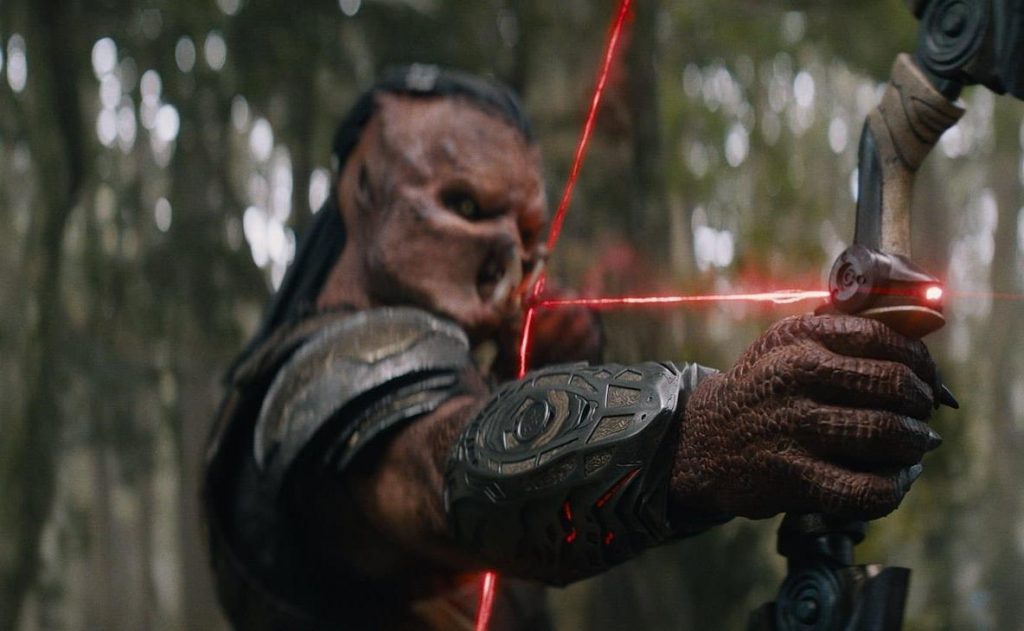There have been many different takes on the Predator franchise, but Predator: Badlands flips the script in a unique way.
Traditionally, a Predator movie has a simple formula—a team of humans are trapped inside an environment where they are being hunted down by the titular predator, and one survivor learns to utilize said environment and take down the creature.
The predators are an honor-bound, hyper-violent alien species known as Yautja, who take great pride in their ability to hunt difficult prey.
Predator: Badlands is the first film in the franchise with a Yautja as the protagonist, introducing viewers to Dek (Dimitrius Schuster-Koloamatangi).
‘Predator: Badlands’ Humanizes A Monster
Portraying an intimidating Yautja as a likable character might seem like an almost insurmountable challenge, but from the very first scene, we are plunged into Dek’s brutal world, with he and his older brother, Kwei, fighting almost to the death.
It might seem hard to relate to a warrior race of aliens with mandibles for mouths, grunting a made-up language, but the scene works because it introduces Dek as something of a loser, suffering under the thumb of an abusive father.
Despite their violent encounter, Dek and Kwei love each other very much, but their warlord father, Njohrr, doesn’t truly love either of them.
Dek seeks to prove himself by hunting the most difficult prey he can find, but Njohrr doesn’t even want him to try—he views the short, relatively weak Dek as the runt of the family, and instructs Kwei to execute Dek on the spot.
Kwei can’t bring himself to do it, sparing Dek and sending him to the foreboding alien planet known as Genna—Njohrr immediately murders Kwei for daring to disobey him.
Dek is left reeling from grief, and vows to hunt down the “unkillable” beast of Genna, the Kalisk, to honor his brother’s sacrifice and prove his father wrong.
It’s a compelling intro that humanizes a seemingly one-dimensional alien creature, without diminishing the warlike nature of the Yautja. Dek survives because his brother breaks the rules and rebels against tradition.
Dek is even shown to be a somewhat inept hunter (at least, for a Yautja), unable to survive the planet Genna without help, and dumb luck.
Interestingly, he can only accept help by lying to himself, dehumanizing his android companion, Thia (Elle Fanning) by referring to her as a “tool.”
Turning the vicious predator into an underdog, bound by the iron-clad laws of his people, proves to be a stroke of genius—I would argue that Dek is even more sympathetic than the lovable monster of Guillermo Del Toro’s Frankenstein.
Planet Genna Is A Monster Paradise
Dek’s experience of the planet Genna mirrors the plight of human protagonists of previous Predator films—he’s out of his depth, finding every inch of the planet to be hostile, in increasingly unexpected ways.
The art direction and VFX work here is top-notch, with the plants and creatures visually distinct, and intertwined in a constant struggle to survive, just like an Earth jungle.
Director Dan Trachtenberg told Variety that his approach to creature design was informed by thinking about the ecosystem of Genna.
“For instance, we had the scene set in the razor grass field, and a creature that that would have evolved to feed in those fields would have developed armor on its hide and a beak to cover its mouth to help push away the grass, so that crazy Cthulhu-y snout could graze,” Trachtenberg said.
“We just tried to apply that everywhere, thinking of what the actual ecology or the evolution of the planet would be so the creatures ended up feeling related — not just cool for cool’s sake or scary for scary’s sake.”
This approach makes Genna feel a bit like Pandora, the world of James Cameron’s Avatar, in which the monsters aren’t just monstrous—they are animals, trying to find food.
Eventually, Dek and Thia adopt a cute creature companion that proves oddly resilient, and vital to their mission.
When they finally encounter the legendary Kalisk, the monster proves to be far less horrifying than the cold, sterile Weyland Yutani corporation (the Alien and Predator franchises are deeply interconnected nowadays).
Predator: Badlands portrays a frightening universe of merciless Yautja and dangerous alien landscapes, but imbues the constant violence with purpose—it’s a dog-eat-dog world, and all of these creatures are just trying to survive another day.
It’s the perfect movie for monster-lovers, and like many others in the genre, Predator: Badlands proposes that humans (or rather, the profit-hungry corporations they create) are worse than any monster.

